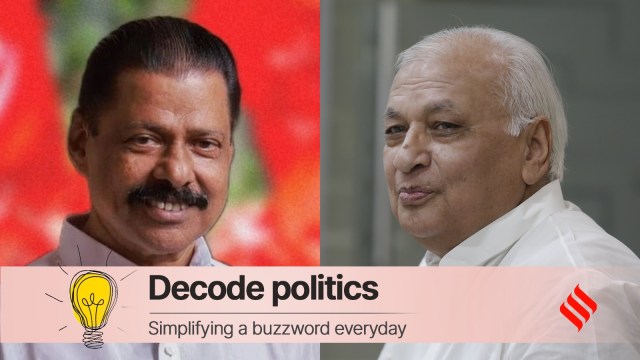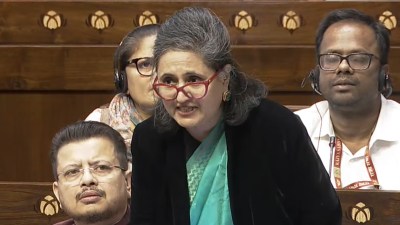Decode Politics: Why a land Bill is the latest flashpoint between Kerala govt, Governor Arif Mohammed Khan
Pinarayi Vijayan government tweaks law to regularise constructions on patta land in high ranges of Idukki district; Governor sits on the Bill citing green activists’ concerns
 From left to right, CPI(M) state secretary M V Govindan and Governor Arif Mohammed Khan. (File)
From left to right, CPI(M) state secretary M V Govindan and Governor Arif Mohammed Khan. (File)The CPI(M)-led Kerala government and Governor Arif Mohammed Khan are yet again entangled in a face-off, this time over the latter’s delay in ratifying the Kerala Land Assignment (Amendment) Bill, which was passed by the Assembly in September 2023.
Why the amendment in the Bill?
The Kerala Land Assignment (Amendment) Bill, 2023, envisages regularisation of all constructions on assigned (patta) lands in the state, especially in the high ranges of Idukki, built in contravention to the original purpose (agriculture or dwelling) for which it has been allocated. While the construction of public roads and houses is allowed under the Bill, urbanisation, and tourism led to the sprouting of illegal constructions.
After hearing several cases related to encroachment in Idukki district, the Kerala High Court earlier directed the department concerned to ensure that construction commences only after no-objection certificates are obtained from various departments. The amendment gives no objection to fresh constructions on such patta lands.
What is the government’s stand?
In the statement of objects and reasons listed in the Bill tabled in the Assembly, the government argued that for the last 60 years, assignees had been using the land concerned for purposes other than for which it was assigned. “Moreover, it has also come to notice that the assignees have violated the conditions attached to the patta,” it said.
Earlier this week, the CPI(M) organised a march to the Raj Bhavan and a hartal in Idukki, when Khan was visiting the district, to protest against the delay in giving assent to the Bill by the Governor.
CPI(M) state secretary M V Govindan said the party would mobilise people of the hilly region for an indefinite agitation against Khan if he continued to withhold the Bill. “It is better that he (Khan) signs the Bill or he will face farmers’ wrath. The Bill is a remedy for land-related problems of the farmers. The BJP is using Khan to push its Hindutva agenda in the state,” he said.
The CPI(M) has also accused the Congress of trying to scuttle the Bill and has accused Congress administrations in the 1960s and 1990s of aggravating the crisis.
What are the political ramifications of the Bill?
The CPI(M) sees the Bill as its trump card to win over the farmers in the high ranges who have been demanding regularisation of constructions for a long time and are seen as traditional backers of the Congress.
When the protests against the implementation of the Kasturirangan report on the preservation of the Western Ghats were at their peak ahead of the 2014 Lok Sabha elections, the CPI(M) backed Church-backed Independent candidate Joice George who won the polls but lost the following election to the Congress’s Dean Kuriakose as the affected farmers voted for the Congress.
Both the CPI(M) and CPI have been accused of links with several illegal constructions in the region. The parties have also set up their offices in high ranges, which is currently not allowed.
What does the Congress say?
Kuriakose has said, “The amended Bill, if ratified, is anti-people. It will force people to pay huge sums as fines for their own land if they do not regularise their land. The CPI(M) does not want the Governor to sign the Bill till the next Lok Sabha elections. The Congress will continue its fight against the CPI(M)’s bid to loot people in the guise of regularising constructions.”
What is the Governor’s stand?
A month after the Assembly passed the Bill, the Kerala Green Movement, a forum of eco-activists, petitioned Khan against ratifying it, claiming that the amended version would be misused by vested groups and lead to environmental disaster in the high ranges of the state.
The organisation and a few others fear that the Bill would pave the way for the regularisation of all illegal constructions in the high ranges, especially in the hill station of Munnar.
Khan has cited the petitions as the reason for not giving his assent to the Bill. “I have received several complaints against the Bill. It was sent back to the government for remarks, but there has been no response. I am not a rubber stamp,” he has said.
The stand-off between Khan and the Kerala government over various issues last year reached the Supreme Court after the government moved it over delay on the Governor’s part in clearing Bills, including one which removed him as the chancellor of state-run universities. The apex court rapped Khan over the delay. “What was the governor doing for two years by sitting on the bills?” the Bench said.
In October, Tamil Nadu and Punjab, too, moved the Supreme Court alleging delay by their Governors in giving assent to Bills.
- 01
- 02
- 03
- 04
- 05





























